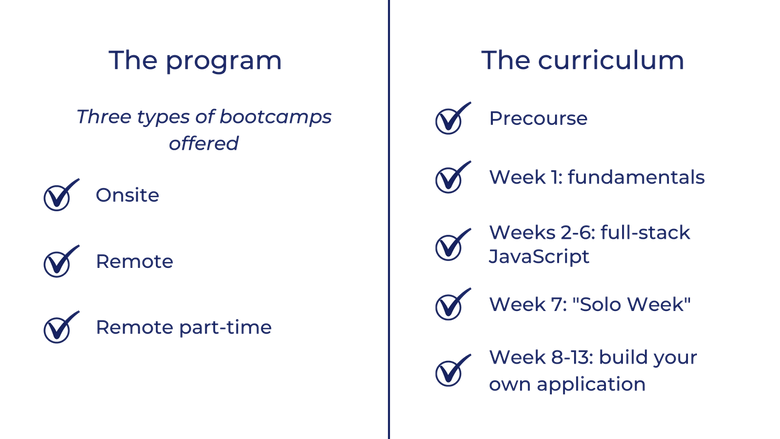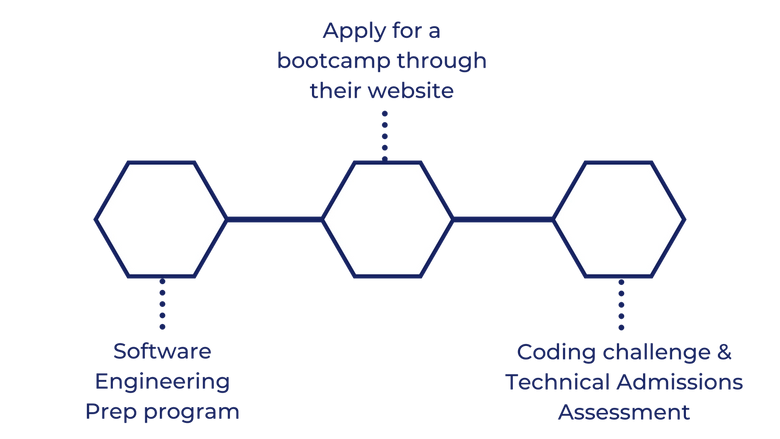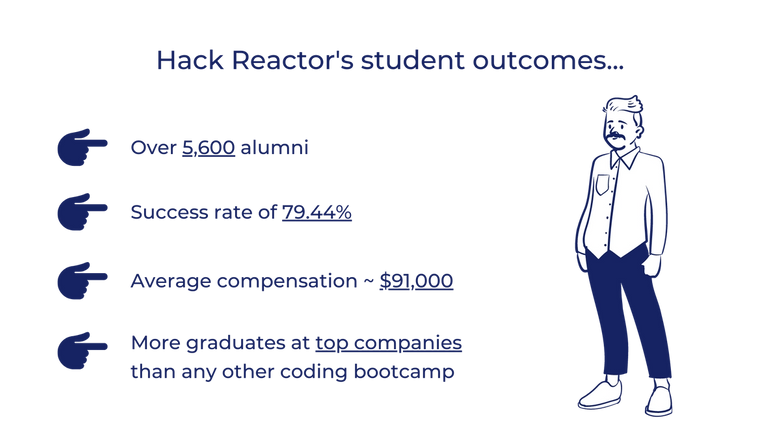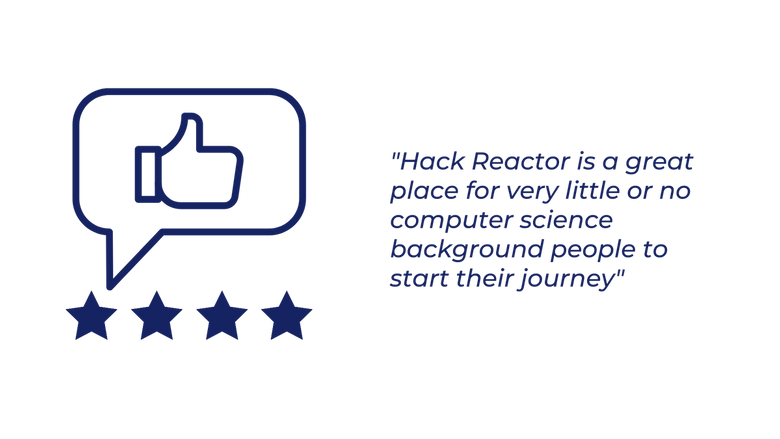Is Hack Reactor the Best Software Engineering Immersive?
Hack Reactor calls itself "the best and most immersive coding bootcamp" but is there truth to these claims? We put in the research to find out.
If you're looking to break into Silicon Valley in software engineering, web development or data science, you've likely done your research into coding bootcamps. These bootcamps are intensive, short-term programs that teach participants how to code in a short amount of time. Though they aren't comparable to a traditional computer science degree at a university, most coding bootcamps aim to teach participants how to think like a software developer and train them on a specific skillset that is highly desired in the industry.
One of the more popular coding bootcamps is called Hack Reactor, an immersive program described as "an advanced coding bootcamp focused on building autonomous software engineers ready for any job in the tech industry." Since its inception in 2012, this software engineering immersive is consistently mentioned on lists of the best coding bootcamps. In this piece, we walk you through what you should know about Hack Reactor so you can decide if it is the best fit for your needs.
What is the program and curriculum like?

The program...
For starters, Hack Reactor offers three types of bootcamps that cater to different learning and lifestyle preferences. The three bootcamps are as follows:
- Onsite (12 weeks full-time, in-person): The onsite bootcamp allows participants to take part in the bootcamp in-person through sites across the country. Locations include Austin, Boulder, Denver, Los Angeles, New York City, San Francisco and Seattle.
- Remote (12 weeks full-time, online): Hack Reactor's remote bootcamp offers the same curriculum, structure and schedule as its traditional onsite bootcamp. However, rather than learning in-person, participants will learn from instructors live online through video conferencing and will have the option to socialize with their fellow programmers during special after-hours events.
- Remote Part-Time (9 months part-time, online): The part-time program allows participants to keep their day jobs and dedicate more time to learning the material and working on projects.
The curriculum...
The Hack Reactor curriculum appears to be largely the same across all three programs. On its website, Hack Reactor explains that the first half of the program is often described as "drinking from a firehose" because participants are expected to absorb huge amounts of information that they will continue building upon throughout the bootcamp. In the second half of the course, participants will leverage their new coding skills to build projects and incorporate new technologies.
On its website, Hack Reactor provides a rough week-by-week schedule for its 12-week program that we've outlined below:
- Precourse: Prior to starting the course, all participants are required to complete the "Precourse" curriculum remotely, which takes roughly 90-120 hours to finish. Upon completion of the program, participants will obtain fundamental knowledge of JavaScript, HTML, CSS and more.
- Week 1: The first week focuses on the fundamentals of computer science, touching on topics like basic and advanced data structures, thinking like an engineer and using JS instantiation patterns.
- Weeks 2-6: Weeks 2-6 focus on teaching full-stack JavaScript which involves understanding JavaScript essentials, studying client and server side concepts and learning database and deployment technologies.
- Week 7: Known as "Solo Week," week 7 has no scheduled lectures and participants will take this time to rest up and work on completing their own individual project.
- Week 8-13: All of the previous weeks build up to the final part of the bootcamp, where participants are put into teams and tasked with building their own application from scratch. In the final week of the program, bootcamp students are also given career services. They receive preparation for the job search and learn more about technical interviews, negotiation tactics and building an online presence.
Am I eligible for the program? How do I enroll?

Before signing up for a Hack Reactor bootcamp, you must first go through the admissions process. Be warned, this process is fairly lengthy; Hack Reactor explains that applicants should expect the process to take 2-4 months, from starting the admissions process up until the first day of the immersive.
Applicants with no coding background can start off taking Hack Reactor's free Software Engineering Prep program, which teaches JavaScript fundamentals that are necessary for Hack Reactor's immersive bootcamps. From there, applicants must apply for a bootcamp through the Hack Reactor website, complete a coding challenge and pass a Technical Admissions Assessment. If you successfully complete all of these steps, you'll finally be admitted into the Software Engineering Immersive program.
Hack Reactor goes out of its way to state there is no "typical" applicant for its bootcamps so you should feel comfortable applying regardless of your background. Some Hack Reactor participants have come from tech adjacent fields, like design or IT, but others come to Hack Reactor with no prior coding knowledge at all.
Does Hack Reactor really work?

Hack Reactor dedicates an entire page on its website to tracking its "Student Outcomes," providing data on compensation, companies and success rate of the program's alumni. Hack Reactor has over 5,600 alumni and boasts a success rate of 79.44% (meaning about 80% of Hack Reactor grads landed jobs within 180 days of graduating from the program).
The average compensation of Hack Reactor's graduates was reported to be approximately $91,000; however, it's worth mentioning that only 85.82% of Hack Reactor's graduates reported compensation data, so this number is likely lower.
On its website, Hack Reactor boasts that it produces more graduates at top companies than any other coding bootcamp. They provide an exhaustive list of companies that past graduates have gone on to work for, which includes well-known tech companies like Google, Facebook, Microsoft, Apple, Uber, PayPal, LinkedIn, Amazon and Adobe.
What have past participants said about Hack Reactor?

On Course Report, Hack Reactor currently holds an average rating of 4.71/5 with almost 300 reviews reported. Many past participants praised the program's curriculum for training them on problem solving skills, exposing them to necessary technical skills and preparing them for the inevitable, grueling job search. One Course Report reviewer discussed their success story from Hack Reactor and explained how they landed a software engineer job shortly after graduating from the bootcamp. They said:
"Hack Reactor is a great place for very little or no computer science background people to start their journey to become a professional software engineer. I was a complete outsider in the software and computer field before HR. From a little knowledge about Javascript when I started my cohort, I graduated being able to create full-stack applications and then got a job as a software engineer a month and a half later. I also appreciate the soft skills I got from HR. From small things like explaining problems clearly when I need help, to pair programming skills, to be autonomous in learning new technologies, all of these skills help me so much in my day to day tasks."
However, one Reddit user had a very different experience with Hack Reactor, harshly calling the coding school "unorganized" and "a dumpster fire." By the end of the program, the participant noted they received very little support from their instructors and the students ended up teaching themselves most of the material. They said:
"I would stay far away from Hack Reactor / Galvanize. I graduated from there last year, and its was an unorganized shit show. The first month or so was going really well. Solid curriculum, the lead teacher was very good. After that first month he quit, and then it became the dumpster fire others have mentioned. After that first solid month there was no more curriculum to study, I would say the majority of our class turned to Udemy to actually learn anything. Our teachers at this point were recent graduates of Galvanize, so going to them for help with a bug or needing help understand some concepts was a 50/50 chance of getting help... Ultimately at Galvanize / Hack Reactor we paid a huge fee for a decent classroom environment in a decent building where we ended up teaching ourselves and each other."
Should I enroll?
It's clear why Hack Reactor continues to gain traction and dominate "Best Coding Bootcamps" lists in recent years. While there are some mixed reviews about the program, many Hack Reactor graduates seem to hold the bootcamp in high regard and the alumni outcomes are no small feat. With specialized curriculum and different types of bootcamps that cater to individuals' preferences, Hack Reactor appears to be a viable option for those looking to invest in a coding bootcamp.
The information provided herein is for general informational purposes only and is not intended to provide tax, legal, or investment advice and should not be construed as an offer to sell, a solicitation of an offer to buy, or a recommendation of any security by Candor, its employees and affiliates, or any third-party. Any expressions of opinion or assumptions are for illustrative purposes only and are subject to change without notice. Past performance is not a guarantee of future results and the opinions presented herein should not be viewed as an indicator of future performance. Investing in securities involves risk. Loss of principal is possible.
Third-party data has been obtained from sources we believe to be reliable; however, its accuracy, completeness, or reliability cannot be guaranteed. Candor does not receive compensation to promote or discuss any particular Company; however, Candor, its employees and affiliates, and/or its clients may hold positions in securities of the Companies discussed.
